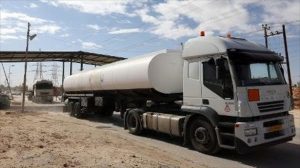By Jamal Adel and Hadi Fornaji.

Khartoum/Tunis, 23 September 2017:
With most petrol stations in the south closed because they have no fuel, the price of petrol in the region has risen to over LD 4 a litre on the black market. In Ghat, Obari and south of Sebha, it is reported to be LD 5.
The official price in petrol stations elsewhere in the country is 150 dirhams (15 girsh or piasters).
Moves are in hand to end the crisis which has affected almost every area of life in the region. Sebha university has again postponed its reopening because staff and students cannot get there and Sebha hospital similarly says that many staff are unable to go in to work and that it is now having a knock-on effect in the provision of treatment.
It has also meant that there is no fuel to transport other goods either, such as foodstuffs.
The price rise is because has been brought about by lack of security, robberies and the diversion of fuel to be smuggled across the border to Niger and Chad. The high prices being paid on the black market in turn spurred further thefts. Earlier this month a convoy of six fuel trucks with 250,000 litres of diesel heading to Sebha were hijacked near Mizda; the drivers were later released after the hijackers took the diesel – as well as the drivers’ belongings including their mobiles.
It is reported that although some of the petrol stations in Sebha – only five out of the 30 or so are still open – are selling petrol when they have it at the official prices, others in the region have joined the bandwagon and are asking the black-market rate.
Some fuel trucks have managed to get through. According to the mayor of Sebha, Hamed Rafeh, one made it to Sebha a couple of days ago. “But it’s not enough,” he told the Libya Herald. “We need at least 100.”
A solution is at hand.
On Wednesday night, a number of southern municipalities agreed a deal with Misrata municipal council under which convoys of petrol trucker heading south from the fuel depot in the city would be provided with a military escort. Under the plan, organised by the mayor of Shuwerif, Hassan Al-Qaddafi, the convoys would have an escort from Mistata to the Jufra area provided by the Misratans, and from there to Sebha provided by the Libyan National Army. The first 120 trucks are said to be ready to leave and, according to Rafeh, should be in Sebha at the beginning of the week.
Ironically, despite being even further away from the fuel depot in Misrata, the towns of Murzuk and Qatrun south of Sebha report a drop in the back market rate in recent days. This is put down to the clampdown on cross-border smuggling by the Tebu Sukour Al-Sahra militia. A fortnight ago 60 trucks, including those smuggling fuel, were stopped on the Libya-Niger border by the brigade.







